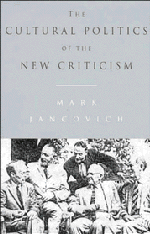Book contents
- Frontmatter
- Contents
- Preface
- List of abbreviations
- Part I The New Criticism and its critics
- Part II The formation of the New Criticism
- Part III The establishment of the New Criticism
- Introduction
- 7 The origins of academic involvement
- 8 Understanding literature: textbooks and the distribution of the New Criticism
- 9 The form of criticism
- Part IV The development of the New Criticism
- Conclusion: Modernism and postmodernism within the American academy
- Conclusion
- Notes
- Bibliography
- Index
7 - The origins of academic involvement
Published online by Cambridge University Press: 18 December 2009
- Frontmatter
- Contents
- Preface
- List of abbreviations
- Part I The New Criticism and its critics
- Part II The formation of the New Criticism
- Part III The establishment of the New Criticism
- Introduction
- 7 The origins of academic involvement
- 8 Understanding literature: textbooks and the distribution of the New Criticism
- 9 The form of criticism
- Part IV The development of the New Criticism
- Conclusion: Modernism and postmodernism within the American academy
- Conclusion
- Notes
- Bibliography
- Index
Summary
Introduction
In the period between 1935 and 1938, Ransom, Tate and Warren did not abandon social and cultural criticism. They did shift from Agrarianism to an involvement in the debates over the teaching of English, but the goal of the latter activity was only seen as an intermediate one. It was hoped that the transformation of the academy would enable the distribution of their social and cultural criticism, and so encourage further social and cultural changes. The shift was not one of political position, but merely a tactical manoeuvre. They had simply identified a more immediate and practical way of promoting their position. In fact, rather than abandoning political activity, Ransom, Tate and Warren moved from an independent critical activity which only involved the writing of articles and participation in the occasional debate, and became active in a number of different areas. They consolidated their ideas in books, established organs of publication, and organized and agitated for institutional change.
These changes in activity were the result of many factors. Some changes, like their involvement in the publication of periodicals, were merely due to the opening up of opportunities. They had argued the need for a periodical since the late 1920s, but had not had the resources to achieve it. Their involvement in arguments over the teaching of English was partly due to their long running conflicts with other types of criticism, particularly over the issue of literary modernism. It was also provoked by the debates developing at the time. More generally, they were aware that Agrarianism had distracted them from their primary interest in literature.
- Type
- Chapter
- Information
- The Cultural Politics of the New Criticism , pp. 71 - 80Publisher: Cambridge University PressPrint publication year: 1993



